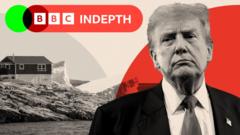As former President Donald J. Trump prepares for a possible return to the White House, leaders from Gulf nations are navigating a complex landscape that has seen significant changes since his last term. Unlike the prior era of nearly seamless cooperation, differences over policies towards Israel and Iran are emerging, revealing a more nuanced and sometimes conflicting dynamic.
Trump's Return: Reassessing Gulf Relations in a Reeling Middle East

Trump's Return: Reassessing Gulf Relations in a Reeling Middle East
Amid shifting geopolitics, Gulf states seek a new balance in U.S. relations under Trump's potential presidency.
With Israel's aggressive military actions in Gaza following the Hamas attack of October 7, 2023, the humanitarian toll has escalated. Reports indicate over 45,000 Palestinian deaths in Gaza alone, leading Gulf states to publicly advocate for a more tempered U.S. policy toward Iran, contrasting with the hardline stance favored by Trump's inner circle, filled with pro-Israel and anti-Iran figures.
Moreover, the ongoing conflicts have left regional powers like Lebanon, where Hezbollah faces unprecedented pressure, grappling with domestic and international challenges. While the relationships with Gulf monarchies remain strong, the unrest calls for a more engaged and perhaps recalibrated American presence, suggesting a need for dialogue that balances regional stability with longstanding U.S. alliances.
As Trump prepares to dive into these sensitive discussions with leaders from nations such as Saudi Arabia, Qatar, and the UAE, the approach could critically redefine alliances and influence the future of Middle Eastern geopolitics.
Moreover, the ongoing conflicts have left regional powers like Lebanon, where Hezbollah faces unprecedented pressure, grappling with domestic and international challenges. While the relationships with Gulf monarchies remain strong, the unrest calls for a more engaged and perhaps recalibrated American presence, suggesting a need for dialogue that balances regional stability with longstanding U.S. alliances.
As Trump prepares to dive into these sensitive discussions with leaders from nations such as Saudi Arabia, Qatar, and the UAE, the approach could critically redefine alliances and influence the future of Middle Eastern geopolitics.























